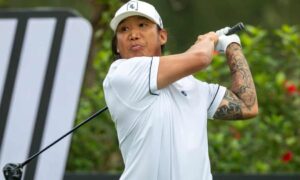
Fourteen years to the day since he won the Houston Open, Anthony Kim tepidly took to a podium in Miami. His shirt hung loose, his face of a man much older than the 38 years depicted in his biography.
“When doctors are telling you that you may not have much time left, that’s a pretty rude awakening,” Kim explained. “I still think about it to this day when I’m out there and I get frustrated with my golf … how far I have come. I got to a point where I may not be here speaking to you guys.”
Kim quickly relaxed. Thursday at Doral was his first appearance in front of general media in a dozen years. He was erudite and self-deprecating while maintaining the element of mystery that has made him such a fascinating character. In the summer of 2012, while at least close to the summit of his sport, Kim required achilles surgery. He was not seen again in a competitive environment until accepting a wildcard offer from LIV at the start of this year.
“My life was already kind of going downhill,” said Kim of 2012 and the first of seven operations. “I was making poor decisions off the golf course; and obviously on, missing that many cuts.
“Once I realised after my surgery that it was going to be possible that I don’t play again, I was completely OK with that. I actually had a Saturday a few months after I got done playing, I had probably three or four rooms full of golf stuff – hats, gloves, balls, shoes, clubs – and I texted a hundred people and said, ‘Just come, whoever gets here fast gets to keep it all.’ It looked like a garage sale.” Four years earlier Kim had trounced Sergio García on Ryder Cup Sunday.
“I don’t blame anybody but myself for the issues that I’ve had,” he added. “With that being said, I was thrown into a situation because I had some success in golf that gave me different opportunities than a normal 23- or 24-year-old and I took advantage of that.
“Once you get going down that slippery slope, it’s hard to make your way back, and unfortunately, I just kept going downhill. Somehow, I’ve made it through. I’m sitting here in front of you just feeling really honoured and blessed to be here because there’s a lot of reasons I shouldn’t be here right now.”
Kim is vague on the fundamentals of his tailspin. He has spoken of “very dark moments,” of “dark demons” and being “around some bad people.” The Californian concedes he has an “addictive personality.”
A recent 65 in Hong Kong showed class is permanent; Kim was basically starting back from scratch. “I’m hearing all these rumours that I played [recreational] golf and was playing in big money games,” he said. “Obviously people have a large imagination when they are sitting in their basement.” Even three weeks before his return, in Jeddah, Kim was unsure about a comeback even though his life felt back on track.
“People were concerned about what I was doing and the place I was in,” Kim said of what came before. “There’s not enough time to get into detail all the things right now. But I got professional help. I think that I didn’t deal with a lot of the trauma and whatever came from my life. I buried it because I didn’t want to show anybody weakness. I thought by showing vulnerability, that was weakness. I’ve come to a point in my life where I don’t care if somebody thinks that about me or not. My daughter is all I care about, and I know it almost sounds corny for me to say but as long as she’s proud of me, I’m a happy man.”
Isabella is now two. She and Kim’s wife, Emily, appear to be his saviours. They watched as Kim spoke so expansively for 40 minutes. “Being a father is the greatest gift that I’ve ever received and I’m not going to let her down,” Kim said.
“I owe a lot to my wife and to my mom, and really, mostly my daughter. When she was born, she came a few months early and the fight that she went through was hard to watch. In that moment, I realised that I have to change my life and the things that I’m doing if I’m going to be able to support her, not financially, but emotionally just be there for her.”
